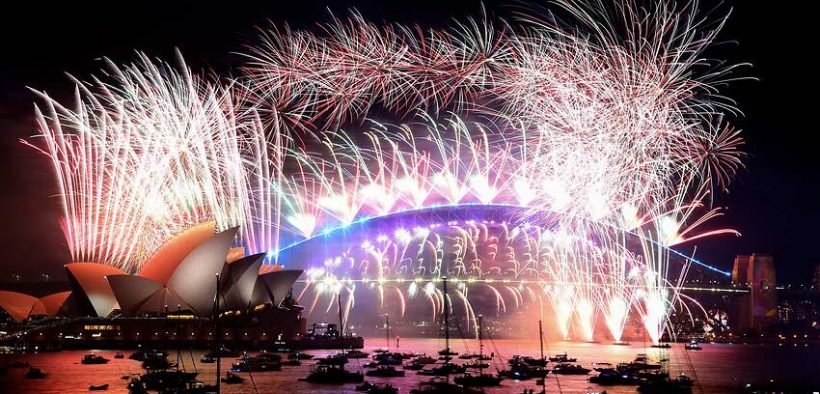Although farewell celebrations to the pandemic year of 2021 across the globe were almost as muffled as those that ushered it in, news that the Omicron variant wave appeared to be starting to recede brought hope for a happier New Year.
In Australia, New South Wales brought in the new year in a somewhat subdued fashion, heading into 2022 with a reduced crowd watching its iconic fireworks displays on Sydney Harbour.
In his New Year’s message, Prime Minister Scott Morrison referred to Australians’ optimistic spirit.
“That is why, despite the pandemic, despite the floods, the fires, continuing drought in some areas, the cyclones, the lockdowns, even mice plagues, Australia is stronger today than we were a year ago. And we’re safer,” he said.
“We have one of the lowest death rates and the highest vaccination rates from COVID anywhere in the world.”
Opposition Leader Anthony Albanese was also positive in his brief New Year’s message, while acknowledging 2021 had been “really tough” with people often isolated for long periods.
“So let’s hope 2022 brings health and happiness for all and a much easier time. Have a happy New Year.”
While crowds exceeding one million people around Sydney Harbour were the norm in years gone by, organisers expected reduced numbers in the context of the latest outbreak.
But many other landmark cities were forgoing pyrotechnics as midnight rolled across the globe, with displays called off at Paris’s Arc de Triomphe, London’s riverside and the Petronas Towers in Kuala Lumpur.
The glittering ball has dropped at New York’s Times Square, but the crowd was a quarter of the usual size – masked up, socially distanced, and with vaccine proof in hand.
Still, South Africa, which first raised the alarm about the new fast-spreading coronavirus variant, gave the world one of the last big good surprises of the year, becoming the first country to declare its Omicron wave had crested – and with no huge surge in deaths. The abrupt lifting of a night-time curfew meant celebrations could ring in 2022.
‘Horrendously bad’
The sudden arrival of Omicron has brought record-setting case counts to countries around the world. Although deaths have not risen in kind, bringing hope the new variant is milder, many countries have reimposed restrictions to prevent healthcare systems from being overwhelmed. Even where gatherings are permitted, many people have chosen to stay home.
At La Querida, a restaurant serving grilled octopus and stuffed peppers in Madrid’s Pozuelo neighbourhood, just four tables out of two dozen were booked for New Year’s Eve. The place had been nearly packed nightly just a few weeks ago before Omicron wiped out business, said head waiter Juan Lozano.
“We all thought… we’d be able to make some money and pay off many things that are overdue,” he said. “The outlook is horrendously bad.”
London’s Big Ben, on top of the Houses of Parliament, chimed at midnight and ring in the New Year for the first time since 2017, after over three years of restoration.
New York’s Times Square celebration, with just 15,000 spectators instead of the usual 55,000 or so, will be a big upgrade from last year’s audience of a few dozen. But with New York state reporting more than 74,000 cases on Thursday and 22 per cent of tests coming back positive, critics wondered whether the celebrations should go ahead at all.
In Los Angeles, the countdown party in Grand Park was called off.
Rapper LL Cool J had to step down as a headliner on ABC’s New Year’s Eve telecast after testing positive.
Global coronavirus infections hit a record high over the past seven-day period, with an average of just over a million cases detected a day worldwide between 24 and 30 December, up some 100,000 on the previous peak posted on Wednesday, according to Reuters data.
With staff off sick, airlines have had to cancel some flights. More than 2,500 were cancelled globally as of early Friday, according to a tally on flight-tracking website FlightAware.com.
In Asia, celebrations were mostly scaled-down or called off. In South Korea, a traditional midnight bell-ringing ceremony was cancelled for the second year, while festivities were banned in Tokyo’s glittering Shibuya entertainment district, and Prime Minister Fumio Kishida took to YouTube to urge people to wear masks and limit numbers at parties.
China, where the coronavirus first emerged in late 2019, was on high alert, with the city of Xian under lockdown and New Year events in other cities cancelled.
But there was good news out of Britain, where a study of a million cases found those with Omicron were around a third as likely to need hospitalisation as those with the previously dominant Delta variant. The results were “in keeping with the encouraging signs we have already seen,” said Susan Hopkins, Chief Medical Adviser at the UK Health Security Agency.













